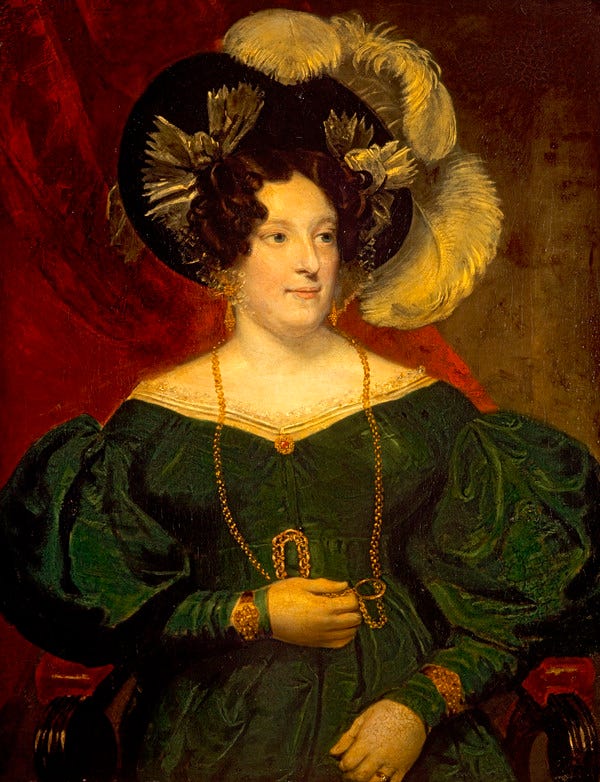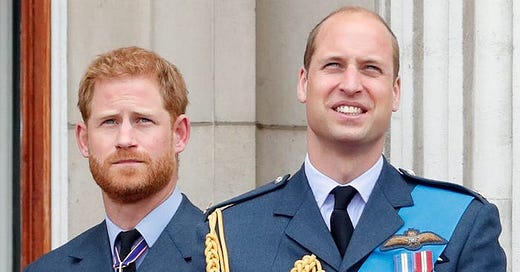Will Prince Harry be Barred from William's Coronation?
Royal history may have something to say about that.
Prince William allegedly doesn't want Prince Harry to attend his coronation—a remarkable breach in royal precedent!
…or is it?
According to a report in The Sunday Times, Prince William allegedly hasn't spoken to his brother, Prince Harry, since they attended Queen Elizabeth's funeral in September 2022. A source told the newspaper that Harry last attempted to bridge the familial divide after news of sister-in-law Kate's cancer diagnosis was revealed in March 2024, reaching out to the Prince and Princess of Wales. However, according to the source, Harry didn't receive a response.
It’s this same “source” that floated the idea of Harry not receiving an invite to William’s eventual/hypothetical coronation, noting, “They are estranged, which is dreadfully sad.”
I’m not here to decide whether this “palace source” is full of jam or delivering a verdict directly from Adelaide Cottage’s basement war room. But I can tell you that the choice to exclude a high-ranking member of the royal family from a coronation would, sadly, be nothing new for our favorite dysfunctional monarchy.
Enter Queen Caroline
Actually, that would more aptly be “Do NOT Enter.”
Let me take you back to the Georgian era, when Carline of Brunswick, Queen of Great Britain, was physically barred from entering her husband, King George IV's, coronation in 1821. The pair had a notoriously tumultuous marriage; the king had long despised Caroline, whom he married in 1795 under pressure from his father, King George III. The couple was ill-suited for each other, with utterly clashing personalities. Namely, George found Caroline's manners, personal hygiene (or lack thereof), and behavior distasteful. The marriage quickly fell apart, with George abandoning Caroline shortly after the birth of their only child, Princess Charlotte.

Caroline was subsequently accused of having multiple affairs, and inappropriate for a consort. George IV (who was, at this time, Prince Regent) tried to use these accusations to justify a divorce through a parliamentary measure called the “Bill of Pains and Penalties” in 1820. The Bill, backed by an inquiry known as the “Delicate Investigation,” aimed to dissolve the marriage and strip Caroline of her titles. The bill failed, but the public support for Caroline during these scandals humiliated George.

By the time George’s coronation rolled around, the couple’s relationship had deteriorated to the point where he sought to completely exclude Caroline from public life—despite her automatically possessing Queen status when her husband took the throne. On the coronation day, Caroline arrived at Westminster Abbey demanding entry, but the doors were literally shut in her face, symbolizing her exclusion from royal power and her husband's life.
Quite the dramatic disavowing on George’s part—one that I’m sure fuels Prince William’s fantasies of fraternal revenge today, exactly 200 years later.
But a word of caution to the next-in-line: Caroline's popularity with the public transformed her into a potent symbol of resistance against the King's authority. While the king's attempt to bar her from his coronation was a symbolic effort on his part to assert his power and to deny her any recognition, the entire episode left George resentful and at odds with public sentiment.






Well, jealousy, bitterness and resentment are never good for anyone. While competition can be a good thing, it becomes toxic when it is so consuming that the competitor looses himself/ herself in the process, failing to focus on things that really matter. Competition can become a poison that robs one of the joy of living an authentic life. Besides, it must be exhausting, and can take a toll on one’s life.
If King Charles lives as long as his mother, a lot will have changed by the time William is crowned.
We shall see.